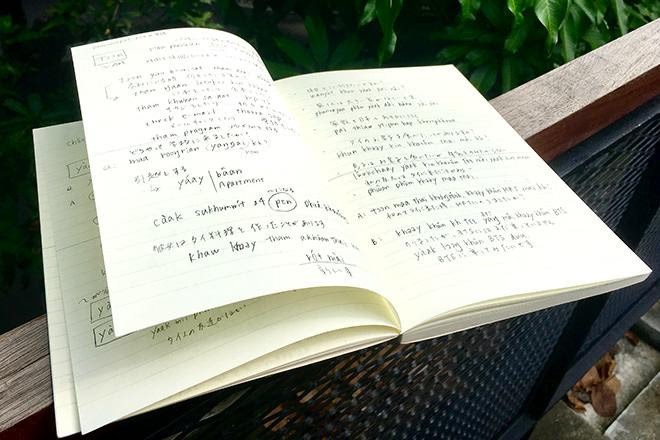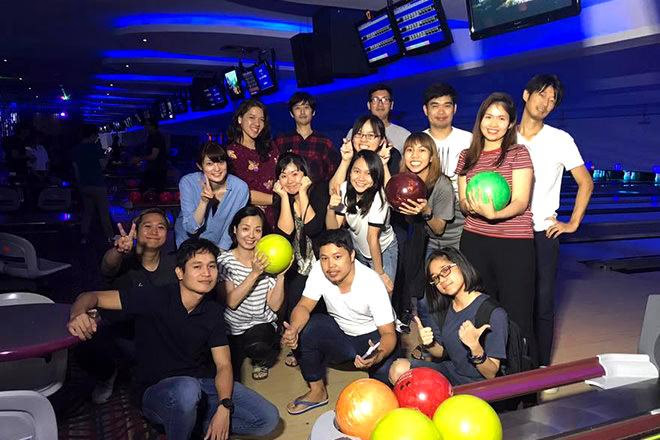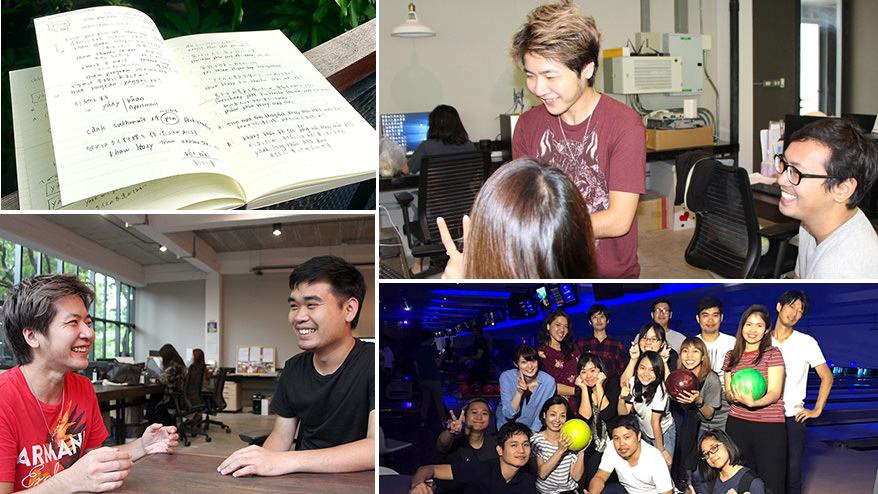Hello
This is Takizuka from Monosus Thailand, posting for the second time.
Everyone calls him "Takki."
It has been six years since I started living in Thailand, and a year has already passed since I started working at MonoThailand.
This time, I would like to introduce some of the things I have noticed since joining Monotai and starting work as a director, as well as some new Thai words I have learned.
1. What I realized after starting work
After joining Monothai, I realized that I couldn't do my job without Thai coders. I've worked with Thai people in my previous jobs, but I felt that I needed to communicate more closely with them in my work as a director.
At first, I just told the coder what the client told me... I still didn't have enough knowledge about coding, so the coder would often say, "I don't understand" or "Ask the client more!" Furthermore, I couldn't manage my schedule well, and sometimes I had to stay overnight at the office to work. At those times, the coder was there to help me.
That was my daily life, but as I continued to work on projects by asking senior directors and researching on my own, I gradually gained more knowledge about development and coding. Then, I began to see things that I hadn't seen before.
Up until now, I thought I had to organize things as much as possible myself so as not to cause trouble for the coders, and to give simple instructions to reduce their burden, but the coders are all professionals. Their knowledge and experience are incomparable to mine. And above all, I realized that they are all kind and trying to help the directors in some way.
When I first came to Thailand, I didn't speak Thai and couldn't understand what people were saying, so when I saw Thai people looking towards me and talking about something, I assumed they were criticizing me, and I became even more withdrawn.
That's why it was a good idea for me to try to learn Thai, but it was still tough not understanding the language.
However, this time I joined the company with a certain level of understanding of Thai, so I can understand what everyone is saying.
Everyone is talking, some of it fun chatter, but also enthusiastically about work.
We have conversations like, "I think it would be better to do it this way," "It'll be fine, I'll do it," "I wonder if Tong can do this? How do you think it can be done?" and when I talk with Japanese directors, I'll say things like, "Excuse me, is this correct here?" "I think it would probably be better if we did it like this," "I just can't do this, so could you ask the client to change the design?... Oh, but when I asked someone else, they were able to do it, so it's fine after all." Through these kinds of exchanges, I began to realize that these things are important.

Chatting happily with Nu-kun (right)
What I think is important when I interact with Thai staff is to respect courtesy first and foremost. I have never worked in Japan, so I don't know, but in Thailand, it is absolutely unacceptable to make remarks that deprive subordinates of their dignity, even if you are a boss. In my past workplaces, there were bosses and subordinates who lacked courtesy, even among Thai people, but here at Monotai, there is no one like that. I am truly impressed by Mr. Miyagawa's ability to judge people.
(If you are friends, I think it's okay to be a little more casual with your language.)
Also, even if the finished product is not what the director expected, do not say negative things like "It's wrong." If you think that your communication was poor and try to think of a better way to say it, such as "I think this is what the customer wanted to say...", you will be able to proceed with the work in a better atmosphere.
What makes Monotai different from other companies is that the Thai members of Monotai are able to understand even if you say something vaguely. I also feel that they have a high level of understanding. (Come to think of it, communication skills were ranked high on the StrengthsFinder list for all the Thai people.)
*StrengthsFinder: A test to find your own strengths from 34 types of "strengths"
We will also talk about laughter, which is essential for people to get along with each other. Japanese people can easily distinguish between seriousness and joking by the atmosphere, but here in Thailand, it is rare for people to laugh at the atmosphere. So, if you can make a joke in Thai and everyone laughs, you can say that you have become quite immersed in Thai culture (laughs).
If you practice telling jokes in Thai on a regular basis, you will naturally come to understand at work how to express things in a certain way that is more likely to be accepted by the other person.
It takes time and effort to understand Thai culture and master Thai language. But I want everyone to work comfortably, and I want my Thai colleagues to be able to convey "thank you" from customers. It's an important job that requires not only words, but also nuances and non-verbal communication.
The Japanese directors' efforts continue.
2. Thai for business use
Needless to say, the director's job involves receiving requests from clients and proceeding with production according to their designs. Therefore, there are many times when I have to give detailed instructions to Thai staff.
In my previous jobs, my Thai was good enough for rough everyday conversation, but for my work as a director, I need to be able to use more advanced expressions.
The interpreters are Ms. Phong and new staff member Sai, but they also have translation duties so they are always quite busy...
In order to reduce their burden even as much as possible, the Japanese director makes every effort to explain even small things in Thai himself!
Below are some excerpts from notes by my fellow director, Mr. Akamine.

Akamine-san's memo
Design Terminology
design maa reew kha. khoo check duu na kha!
Designed by Mar Leo Kochekdunaka.
mii layer kon ×× mai kha?
Me layer con ×× myca?
mai muan gap design kha!
Maimuang Gap Design K.
khoo tat ruup nii kha.
Coat loop knees
yai pai kha / rek pai kha.
Yai Pai Ka/Lek Pai Ka
Coding Terminology
khoo sai .... ( link, scrol, botton, text )
Ko Sai…
tam neen ×× pan kha.
Tamneen ×× Panka
mai hen ×× kha!!
My hen ××ka
text tok koop kha (tok alone might work)
Text Tok Corp.
khoo tam muan gap ××
Koh Tam Muang Gap XX
Communication terminology
chan cha rong taam ruu kaa kha!
Chan cha long term rooker ka!
chan cha check duu reew ko book iik na kha.
Chang cha check doo laek koh bok eek na ka.
yan mai dai rap ×× kha.
Yang Mydai Wrap ×× Ka
chai wee raa ki chua mong (sai JS) kha?
Chai weela ki chua moon (Sai JS) Ka?
chan kit waa ×× jam pen kha.
Chang Kit Wah ×× Jampen Ka.
taa yaak tam ×× cha tam yangai dii kha?
Tha yak tam xx cha tam yangai dee ka?
pokati tam yangai kha?
Pokati tam yangai ka?
The Japanese director goes to the coder's desk (or has them come to his desk) and uses gestures to communicate these words. I think that if it's a simple word, the work speed goes up and the distance with the coder gets closer if I communicate it verbally.
The key point when communicating is to enunciate clearly and confidently, even if you are not good at it. People will be able to understand even if your pronunciation is different.
However, even if you understand the meaning, you may not be able to hear the answer! That's where you need to practice (lol).
Bonus corner
As a bonus, I'll introduce the characters of the Monotai members based on Takki's arbitrary and bias opinion.

Bowling activity
Miyagawa-san : He's everyone's big brother. He's always worried about everyone and is on edge.
Kawamura-san : She's surprisingly cute and shy. Even though she's shy, she says what she wants to say.
Matchy : Takki often teases him and he says things like, "What? You're kidding," and "Stop it, stop."
Akamine-san : Recently I've been feeling revived in many ways and I'm also addicted to massages. I'm trying my best to pronounce Thai!
Fon : She's a reliable girl and like an older sister to everyone. She has more of a sense of responsibility than Japanese people, but her mood is easily shown on her face.
Tong : He's a humble leader who always raises his hand before speaking.
Mong : When I wake up, he's either in the bathroom or asleep.
Nu : He's always calm and so kind it makes me sad.
Ploy-chan : She's innocent, cheerful and loves to joke around, but she's also reliable and thoughtful.
Oil-chan : She often gets sick and is late, but once she gets to work she's always active and in good spirits.
Tun : He looks cool, has pink hair and big earrings, but he's very polite.
Joy-chan : Everyone calls her a wild monkey, and she sometimes has her zipper open, but she's a beautiful woman.
Noo : She's cute when she's quiet, but when she talks weird things come out of her mouth.
May-chan : Her voice is so cute! She's serious, but sometimes I notice her closing all the windows and going to sleep.
Bird : His mind is quick and he absorbs information like a sponge. He says some things but it's hard to understand.
Tae : He is never late and always greets people. I wonder if he is really Thai, but I look forward to seeing him in the future.
Fluke : I'm still unsure. I'm the first Thai smoker. My nickname is Fricky.
Sai : I'm like a younger sister studying Japanese with my older brother. I'm worried that I'll learn strange things because I'm next to Noo.
That's it!
Next time, I'll write about Buddhism, a topic that delves a little deeper into Thai culture. Thai Buddhism might solve your problems!

